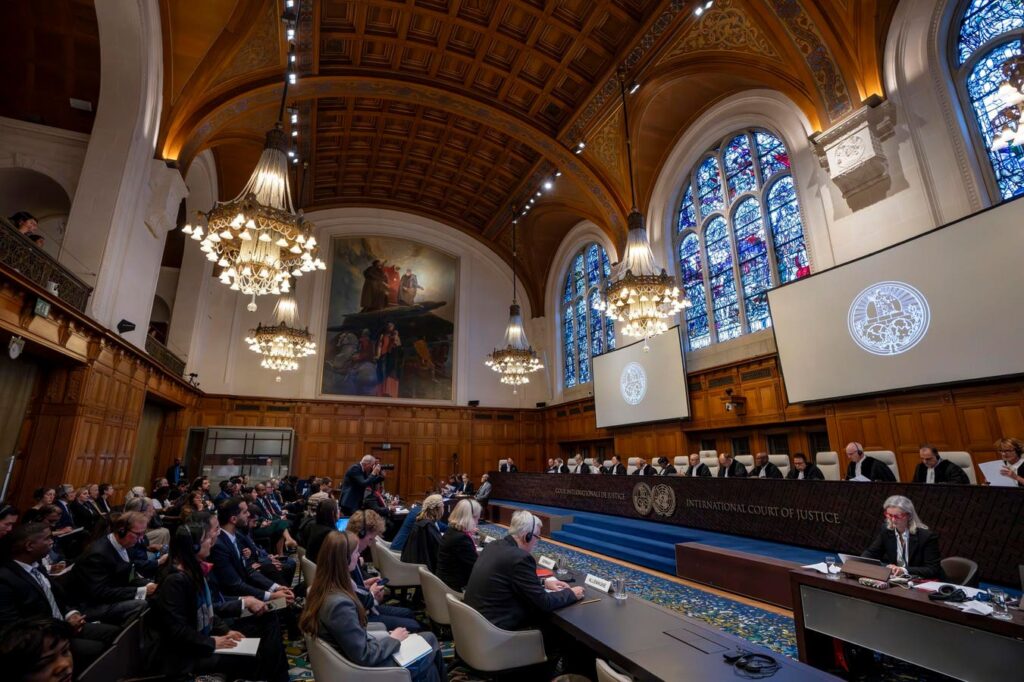Judges are seated as the International Court of Justice in The Hague, Netherlands, opens hearings … [+]
For the first two weeks in December, the International Court of Justice held oral hearings for its Advisory Opinion relating to the Obligations of States in respect of Climate Change. At the request of the United Nations General Assembly, the ICJ will determine the existing financial liability of countries for their contribution to climate change and what actions countries must take to prevent climate change. At the conclusion of the hearings, four judges posed questions to the participants. Sixty-four responses were received by the December 20 deadline.
The ICJ was established in 1945 through the UN Charter to handle legal disputes between nations. Known as the World Court, it is an outlet for countries to settle civil disputes through a neutral court. The ICJ is based in the Peace Palace in The Hague, Netherlands, which is also the home of the Permanent Court of Arbitration. Notably, the International Criminal Court, that recently issued an arrest warrant for Israeli Prime Minister Benjamin Netanyahu, is also located in The Hague. The ICJ and the ICC operate independently with different jurisdictions.
The ICJ is composed of 15 judges elected by the UNGA and UN Council to serve a term of 9 years. A country may only have one judge serving on the ICJ at a time.
The President of the Court is Judge Nawaf Salam of Lebanon. The remaining judges represent Australia, Brazil, China, France, Germany, India, Japan, Mexico, Romania, Slovakia, Somalia, South Africa, Uganda, and the United States of America
On March 29, 2023, at the request of Vanuatu, the UNGA asked the ICJ to issue an advisory opinion on the legal obligations of countries in preventing climate change. The opinion, while non-binding, will give an indicator of how the Court may interpret future climate related litigation and guide future legislative development.
The UNGA asked two questions:
“What are the obligations of States under international law to ensure the protection of the climate system and other parts of the environment from anthropogenic emissions of greenhouse gases for States and for present and future generations”?
“What are the legal consequences under these obligations for States where they, by their acts and omissions, have caused significant harm to the climate system and other parts of the environment, with respect to: (i) States, including, in particular, small island developing States, which due to their geographical circumstances and level of development, are injured or specially affected by or are particularly vulnerable to the adverse effects of climate change? (ii) Peoples and individuals of the present and future generations affected by the adverse effects of climate change?”
On December 2, Vanuatu and the Melanesian Spearhead Group opened the hearings giving, in essence, an opening argument. Over 100 countries and parties presented oral statements in 30 minute increments from December 2 – 13. Notably, the oral statements were provided to the court in advance, with citations. Verbatim written transcripts of the daily hearings are posted on the Court’s website. Written statements were released daily as parties made their oral statements.
Legal arguments in the written and oral statements begin with the United Nations Convention on Climate Change and the Paris Agreement. Large countries, including the United States, Australia, and Germany, argued that the creation of a treaty that specifically addresses climate change overrides any other international law on the subject. This is known as lex specialis. Therefore, no additional legal obligations exist that may create a call for reparations or action not directly negotiated.
Developing countries argue that the UNCCC and the Paris Agreement are a starting point, but that the impacts of climate change violate human rights under international common law and the Universal Declaration of Human Rights. As a result, those countries that contribute to climate change, through the production of fossil fuels and GHG emissions, should pay reparations to low lying and developing nations that are “adversely impacted” by climate change.
In the opening statement, President Salem outlined the process for follow up questions by the Court. Unlike an American appellate court where the judges frequently interject with questions, the ICJ withheld questions until the end. Judges that had questions submitted them in writing to the participants on December 13. Participants had until December 20 to file a written response.
Four judges posed questions: Judge Sarah Cleveland of the US, Judge Dire Tladi of South Africa, Judge Bogdan-Lucian Auresco of Romania, and Judge Hilary Charlesworth of Australia.
Generally, Judge Cleveland asked what obligations oil producing countries have to reduce GHG emissions. Judge Tladi asked countries to address if the obligations of the Paris Agreement are procedural or binding. Judge Auresco asked for further explanation of the argument that there exists a right to a clean, healthy and sustainable environment in international law. Judge Charesworth asked about the impact of the Paris Agreement on existing international law relating to compensation.
Participants that wished to reply could answer any or all the questions posed. The ICJ posted the written replies on their website.
The parties that responded are: African Union; Albania; Bahamas; Bangladesh; Barbados; Belize; Bolivia; Cameroon; Canada; Chile; China; Colombia; Comores; Cook Islands; Commission of Small Island States; Costa Rica; Côte d’Ivoire; Congo; Ecuador; Egypt; the European Union; France; Germany; Grenada; Guatemala; India; Indonesia; the International Union for Conservation of Nature; Japan; Kiribati; Kuwait; Latvia; Liechtenstein; Maldives; Marshall Islands; Mexico; Micronesia; Myanmar; Nambia; Nauru; New Zealand; the Organisation of African, Caribbean and Pacific States; Pakistan; Palau; Panama; Papua New Guinea; Philippines; Russian Federation; Saint Lucia; Saint Vincent and the Grenadines; Samoa; Saudi Arabia; Seychelles; Slovenia; Switzerland; Thailand; The Gambia; Tonga; Tuvalu; the United Kingdon; Uruguay; the United States.
Read the full article here
